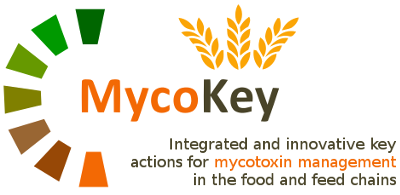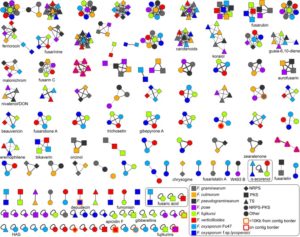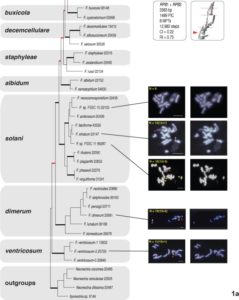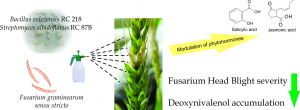Scientific Papers
MycoKey aims to unlock new knowledge and to valorize existing knowledge and data by rapid dissemination to research partners and stakeholders in the chain.
In the MycoKey programme all scientific peer reviewed publications are available through open access. Research data will be deposited in public data repositories for (re)-analysis exploitation and dissemination free of charge.
In this page you can find publications describing the scientific results arising from project’s activities.
MycoKey Round Table Discussions of Future Directions in Research on Chemical Detection Methods, Genetics and Biodiversity of Mycotoxins
MycoKey, an EU-funded Horizon 2020 project, includes a series of “Roundtable Discussions” to gather information on trending research areas in the field of mycotoxicology. This paper includes summaries of the Roundtable Discussions on Chemical Detection and Monitoring of mycotoxins and on the role of genetics and biodiversity in mycotoxin production. Discussions were managed by using the nominal group discussion technique, which generates numerous ideas and provides a ranking for those identified as the most important. Four questions were posed for each research area, as well as two questions that were common to both discussions. Test kits, usually antibody based, were one major focus of the discussions at the Chemical Detection and Monitoring roundtable because of their many favorable features, e.g., cost, speed and ease of use. The second area of focus for this roundtable was multi-mycotoxin detection protocols and the challenges still to be met to enable these protocols to become methods of choice for regulated mycotoxins. For the genetic and biodiversity group, both the depth and the breadth of trending research areas were notable. For some areas, e.g., microbiome studies, the suggested research questions were primarily of a descriptive nature. In other areas, multiple experimental approaches, e.g., transcriptomics, proteomics, RNAi and gene deletions, are needed to understand the regulation of toxin production and mechanisms underlying successful biological controls. Answers to the research questions will provide starting points for developing acceptable prevention and remediation processes. Forging a partnership between scientists and appropriately-placed communications experts was recognized by both groups as an essential step to communicating risks, while retaining overall confidence in the safety of the food supply and the integrity of the food production chain.
Authors: John F. Leslie , Veronica Lattanzio , Kris Audenaert , Paola Battilani , Jeffrey Cary , Sofia N. Chulze , Sarah De Saeger , Annamaria Gerardino , Petr Karlovsky , Yu-Cai Liao , Chris M. Maragos , Giuseppe Meca , Angel Medina , Antonio Moretti , Gary Munkvold , Giuseppina Mulè , Patrick Njobeh , Ivan Pecorelli , Giancarlo Perrone , Amedeo Pietri , Juan M. Palazzini , Robert H. Proctor , Endang S. Rahayu , Maria L. Ramírez , Robert Samson , Jörg Stroka , Michael Sulyok , Mark Sumarah , Cees Waalwijk , Qi Zhang , Hao Zhang ,Antonio F. Logrieco
Keywords: antibodies; biological control; communication with non-scientists; metabolomics; microbiome; multi-mycotoxin detection protocols; nominal group discussion technique; proteomics; transcriptomics
Published: 01/03/2018
Repository: https://www.ncbi.nlm.nih.gov/pubmed/29494529
This work has received funding form the the EU’s H2020 research and innovation programme under GA No 678781- MycoKey and the Kansas Agricultural Experiment Station and the Feed the Future Innovation Lab for the Reduction of Postharvest Losses.
CC-BY license http://creativecommons.org/











